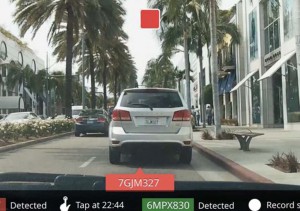“There’s an app for that,” or so said the salesman offering a customer his first smartphone. With the Apple Store alone listing something north of 1 million apps, that’s pretty close to true for anything you might want, and Google not far behind for its Android system.
Manufacturers are now racing to integrate smartphone apps into the very core of their in-car entertainment systems with the likes of Ford’s Sync 3, Apple CarPlay and Google Android Auto. In turn, software writers are looking for ways to come up with more creative apps to appeal to motorists.
A growing number of options are out there, including the wildly popular Waze, which can help drivers shift their routes to avoid traffic jams. But several others are under development that could allow you to modify your route for other reasons – including the ability to stay in touch, and to avoid bad drivers.
Israeli tech firm Nexar is developing one program that would use the camera of your iPhone to constantly monitor traffic around your vehicle. It would capture the license plate of vehicles passing by and compare them to a database of “bad drivers.”
Nexar CEO Eran Shir recently revealed a prototype during the annual Code Conference, in California, claiming that his company has more than 500 billion hours per year of driving data.
If a user were to spot someone driving erratically or, say, demonstrating road rage, they would simply tap the screen of their iPhone to identify that person as a bad driver. Meanwhile, the app would also notify you if someone listed in the database were driving nearby.
The idea is to identify road risks and let good drivers steer clear. Of course, the proposed service does raise some questions about privacy, among other things. It could, for example, let someone prone to speeding click the app every time they get stuck behind a driver who believes in speed limits.
Longer-term, would such a database be tapped into by the police — or by insurance companies looking for ever better ways to identify and penalize risky motorists?
During the conference, well-known tech writer and moderator Walter Mossberg joked that Nexar’s app could become, “an outrageous invasion of the privacy of bad drivers.”
(Ford launching updated Sync 3 in the U.S. this summer. Click Here for the story.)
Apple, meanwhile, is working up a very different feature that could be controversial for different reasons.
A variety of vehicles already come equipped with navigation systems that can warn of traffic jams and help map out an alternate route. Waze has taken that function to new levels. Tesla, meanwhile, recently updated the mapping system in its Model S battery-car to let a driver stay closest to where charging stations are available.
Apple recently published a patent for a system that would route you according to where you’d get the best cellphone signals along the way, avoiding those unexpected points where coverage might drop out.
The concept might find some opposition from those worried about distracted drivers who endlessly chat on cellphones or tap away texting. But the reality is that more and more technology – including some safety systems – are coming to depend on keeping cars connected.
Virtually every car in the Chevrolet fleet now comes with built-in 4G LTE connectivity, and other makers like Chrysler and Audi are adding similar technology. Parents can keep kids occupied on long trips by watching streaming video. Motorists can use the technology to tune into services like Pandora and Spotify. General Motors’ OnStar will soon use 4G technology to help track the health of a vehicle and alert a motorist to a pending breakdown.
(Chevy adding Android Auto, Apple CarPlay to 14 different models for 2016. Click Here for more.)
“The system,” notes the Apple patent, “can select a longer route having better signal strength over a shorter route having worse signal strength.”
First filed in 2012, Apple just revealed the technology. It isn’t clear what its plans are but it could be used to enhance the mapping functionality of a vehicle equipped with CarPlay.
(Fiat Chrysler admits to missing five recall deadlines. Could face major fines. Click Here for that breaking story.)


I suspect the monitoring of other vehicles for driving behavior – while a good safety idea, will be challenged and removed as an invasion of privacy. What the system could do is alert authorities to the “bad drivers” but in the U.S. that could honestly be 90+ % of drivers on the roadways. There is no way authorities could possible ticket even a small percentage of these dangerous drivers. There in lies a major problem.
In all honesty if I were a local police officer with a superfast computer in my car that could immediately issue a speeding ticket to every vehicle I see daily driving 6+ mph over the posted speed limit, I could easily issue 1,000 or more tickets daily without even trying. That doesn’t include the drug crazed people behind the wheel… It’s a combat zone out there IMO and getting worse by the week.
While in theory this system might be of value, I see it more as just another electronic toy distraction that allows people to continuously “stay in touch with others” instead of staying in touch with their driving. There are advantages to “connecting cars” but cellphone, texting, infotainment and other electronic based distractions are not of value at all. They will just increase the distracted driving problem no matter what sales pitch the auto makers and system purveyors make.
It’s ALWAYS about the money, not safety!
How could anyone avoid all of the terrible drivers?